出色的社區網站
游戲設計分析 (GAME DESIGN ANALYSIS)
The Last of Us became an instant classic the day it was released, back in 2013. At the sunset of the sixth console generation, it felt like Naughty Dog managed to raise the bar in all critical areas of game development simultaneously. The authentic characters, compelling story-telling, both the technical and artistic excellence: this game nailed everything.
《 Last of Us》于2013年發行之日就立即成為經典之作。在第六代游戲機落日之際,感覺就像Naughty Dog設法在游戲開發的所有關鍵領域中同時提高了標準。 真實的角色,引人入勝的故事講述,以及技術和藝術上的卓越表現:這款游戲釘住了一切。
The Last of Us has so many outstanding attributes to mention that relatively few people discuss its game design qualities. That’s a good problem to have if you ask me.
《最后的我們》擁有眾多出色的屬性,因此很少有人討論其游戲設計質量。 如果你問我,那是一個好問題。
People tend to overlook it precisely because game designers have put a tremendous amount of effort to blend the mechanics into the flow. The systems subtly convey the intentions, themes, and setting of the experience without ever having to take the spotlight away from the story.
人們往往會忽略它,因為游戲設計師付出了巨大的努力來將機制融合到流程中。 這些系統巧妙地傳達了意圖,主題和體驗背景,而無需將焦點從故事中移開。
Bad design is immediately noticeable. Excellent design is invisible.
錯誤的設計會立即引起注意。 優秀的設計是看不見的。
I was studying game design when The Last of Us released, and I remember finding the crafting system to be well-conceived at the time. Years later, I had to design a complete crafting system myself; it was the first inspiration that came to my mind. With much more experience, I got a better understanding of why it’s so effective at what it does.
當《我們的最后時刻》發行時,我正在研究游戲設計,我記得當時發現的手工制作系統是精心構思的。 多年后,我不得不自己設計一個完整的制作系統; 這是我想到的第一個靈感。 有了更多的經驗,我對為什么它如此有效的原因有了更好的理解。
In this article, I detail each component of the crafting system, explain the intentions behind Naughty Dogs’ creative choices and explain how they smartly solve complex design problems.
在本文中,我詳細介紹了制作系統的每個組件,解釋了頑皮狗創意選擇的意圖,并解釋了它們如何巧妙地解決復雜的設計問題。

什么是手Craft.io(什么不是) (What crafting is (and what it’s not))
Crafting is one of these catch-all terms in gaming. In The Last of Us, it’s the following 3-steps process:
手工制作是游戲中這些通俗易懂的術語之一。 在《我們的最后時刻》中,該過程分為以下三個步驟:
Collect crafting supplies.
收集手Craft.io品。
Transform them into items in the dedicated Crafting menu.
將它們轉換為專用“ 制作”菜單中的項目。
Use the crafted items to overcome gameplay situations.
使用精心制作的物品來克服游戲上的情況。
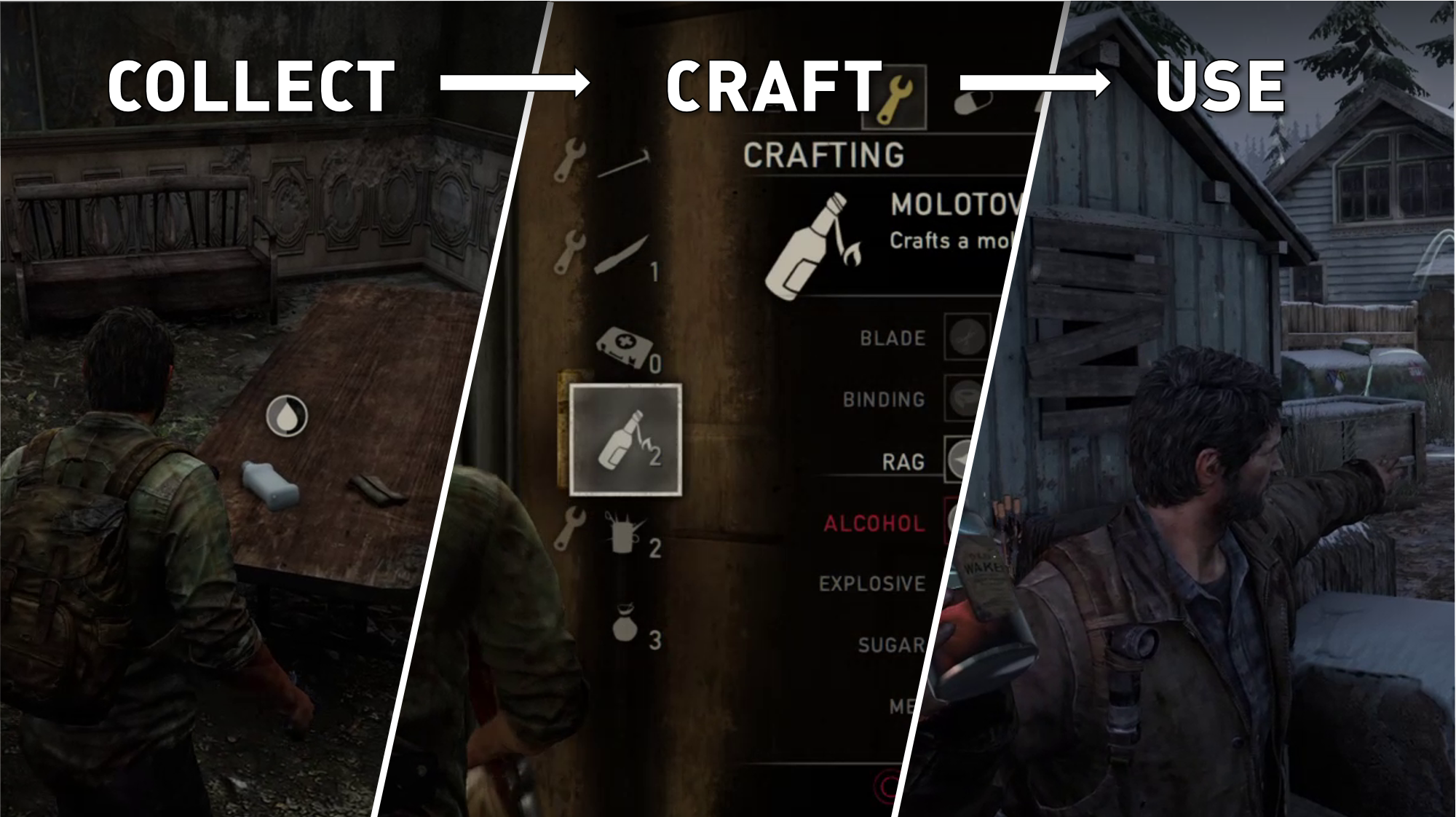
您如何處理手工系統的設計? (How do you approach the design of a crafting system?)
When I started the design of crafting in Ghost Recon: Breakpoint, I quickly faced a ‘chicken and egg problem’ and realised it’s not the type of system you can figure out independently from its content.
當我開始在《 Ghost Recon:Breakpoint》中進行Craft.io設計時,我很快遇到了“雞和蛋的問題”,并意識到這不是您可以獨立于其內容而解決的系統類型。
You can essentially boil down a crafting system to the following three elements: a series of input elements, a set of outputs and transformation rules from one to the other. And you can’t match just any input with any output: the conversion must be logical and coherent. Whichever comes first shapes how the other needs to be.
基本上,您可以將Craft.io系統簡化為以下三個元素:一系列輸入元素,一組輸出以及從一個到另一個的轉換規則。 而且,您不能僅將任何輸入與任何輸出進行匹配:轉換必須是邏輯且連貫的。 誰先決定另一個人的需求。
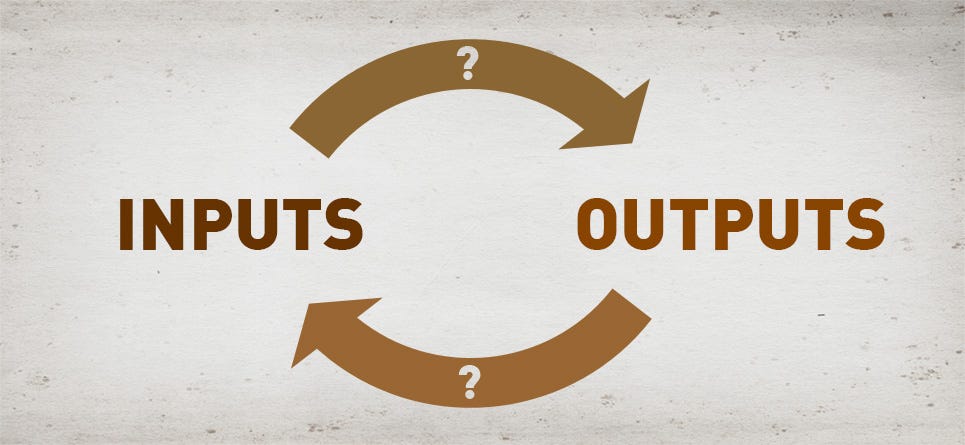
For games set in real-life inspired universes, game designers must find somewhat plausible crafting recipes and won’t be able to come up with their own convenient logic.
對于以現實生活為靈感的宇宙中的游戲,游戲設計師必須找到合理的手法配方,并且無法提出自己的便捷邏輯。
Whatever the origin, it will require time and several iterations until you find a good compromise between coherence, exciting content, and a pleasant system to manipulate.
無論起源如何,都需要時間和多次迭代,直到您在連貫性,令人興奮的內容和令人愉悅的操縱系統之間找到良好的平衡。
For The Last of Us, here is a probable approximate order the team designed the game loop. These themes constitute the three parts of this article.
對于The Last of Us ,這是團隊設計游戲循環的大概順序。 這些主題構成了本文的三個部分。
1 Collect: they wanted from the start of the project to have the player explore and scavenge in the post-apocalyptic environment.
1 收集:他們從項目開始時就希望玩家在末日后的環境中進行探索和清理。
2 Use: as they worked on the combat and level design, they figured out which exciting items to give to the player.
2 使用:在進行戰斗和關卡設計時,他們找出了可以給玩家帶來哪些刺激的物品。
3 Craft: finally, they designed crafting recipes and built the menu to support it, then iterated to maximise its usability and comfort.
3 Craft.io:最后,他們設計了Craft.io配方并構建了菜單來支持它,然后對其進行迭代以最大程度地提高其可用性和舒適性。
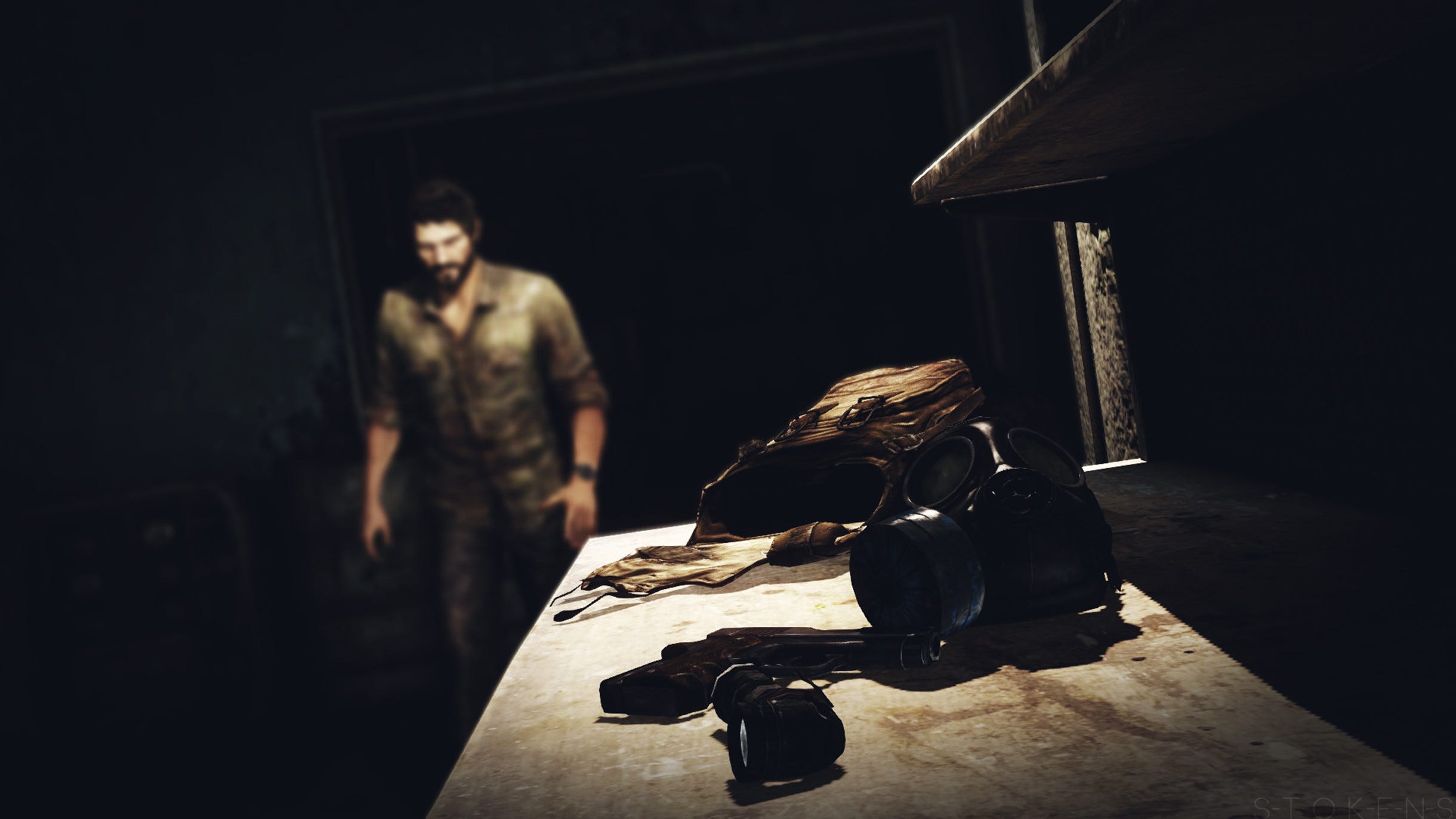
第1部分:收集手Craft.io品 (Part 1: Collecting crafting supplies)
清除策略 (Scavenging strategies)
The Last of Us is a linear game which features more open sections than previous Naughty Dog games. Gathering additional crafting supplies is the core motivation to explore all these extra spaces.
《最后的我們》是一款線性游戲,具有比以前的頑皮狗游戲更多的開放區域。 收集更多的手Craft.io品是探索所有這些額外空間的核心動機。
But they had a problem: with cluttered post-apocalyptic environments, making the player search crafting supplies by observation alone could have been akin to finding a needle in a haystack.
但是他們有一個問題:在世界末日混亂的環境中,讓玩家僅靠觀察就可以搜尋手Craft.io品,這可能類似于在大海撈針中找針。
Naughty Dog already puts a tremendous amount of effort into directing the player through its levels without relying on HUD. They would never add a radar or compass to point out interactive elements as most open games do. They opted instead to have a discreet icon appear when Joel is in the immediate proximity of an item.
頑皮狗已經在不依賴HUD的情況下付出了巨大的努力來引導玩家通過其關卡。 他們絕不會像大多數開放游戲一樣添加雷達或指南針來指出交互元素。 他們選擇在喬爾(Joel)緊鄰某物品時顯示謹慎的圖標。
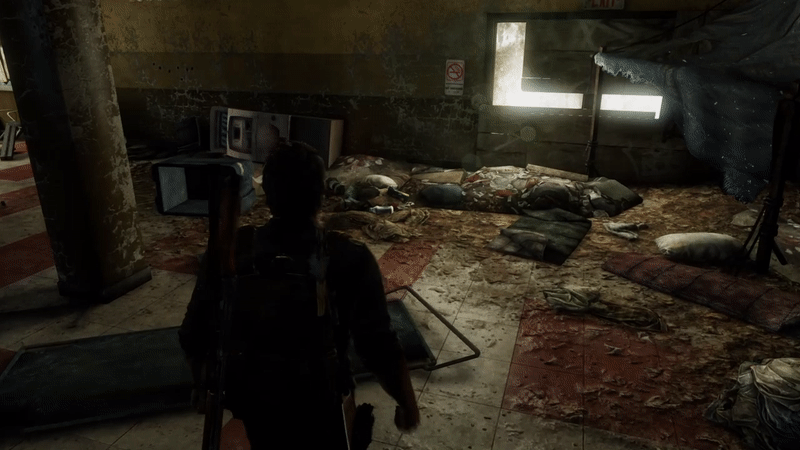
This mechanic eliminates almost entirely the observation challenge, which wouldn’t be fun even with the shiny shader, but it’s still entertaining. The player is now incited to approach exploration strategically: visit every room, check behind every cover and be on the lookout of the little icon that pops.
該機制幾乎消除了觀察方面的挑戰,即使使用發亮的著色器也不會很有趣,但是仍然很有趣。 現在,該玩家被激發去戰略性地進行探索:走訪每個房間,檢查每一個掩體的后面,并監視彈出的小圖標。
Most pickups aren’t on the critical path of the level: if you rush, you only get a few, but if you conscientiously search through the entire play area, you gain several useful rewards. And more importantly, you get a real sense of discovery. The Last of Us is a linear game, yet ironically it makes you experience exploration better than open-world games in which you only go from an icon on a map to another.
大多數拾音器不在關卡的關鍵路徑上:如果著急,您只會得到一些,但是如果您認真搜索整個游戲區域,則會獲得一些有用的獎勵。 更重要的是,您將獲得真正的發現感。 《最后的我們》是一款線性游戲,但具有諷刺意味的是,它使您比僅在地圖上的一個圖標進入另一個圖標的開放世界游戲更好地體驗探索。
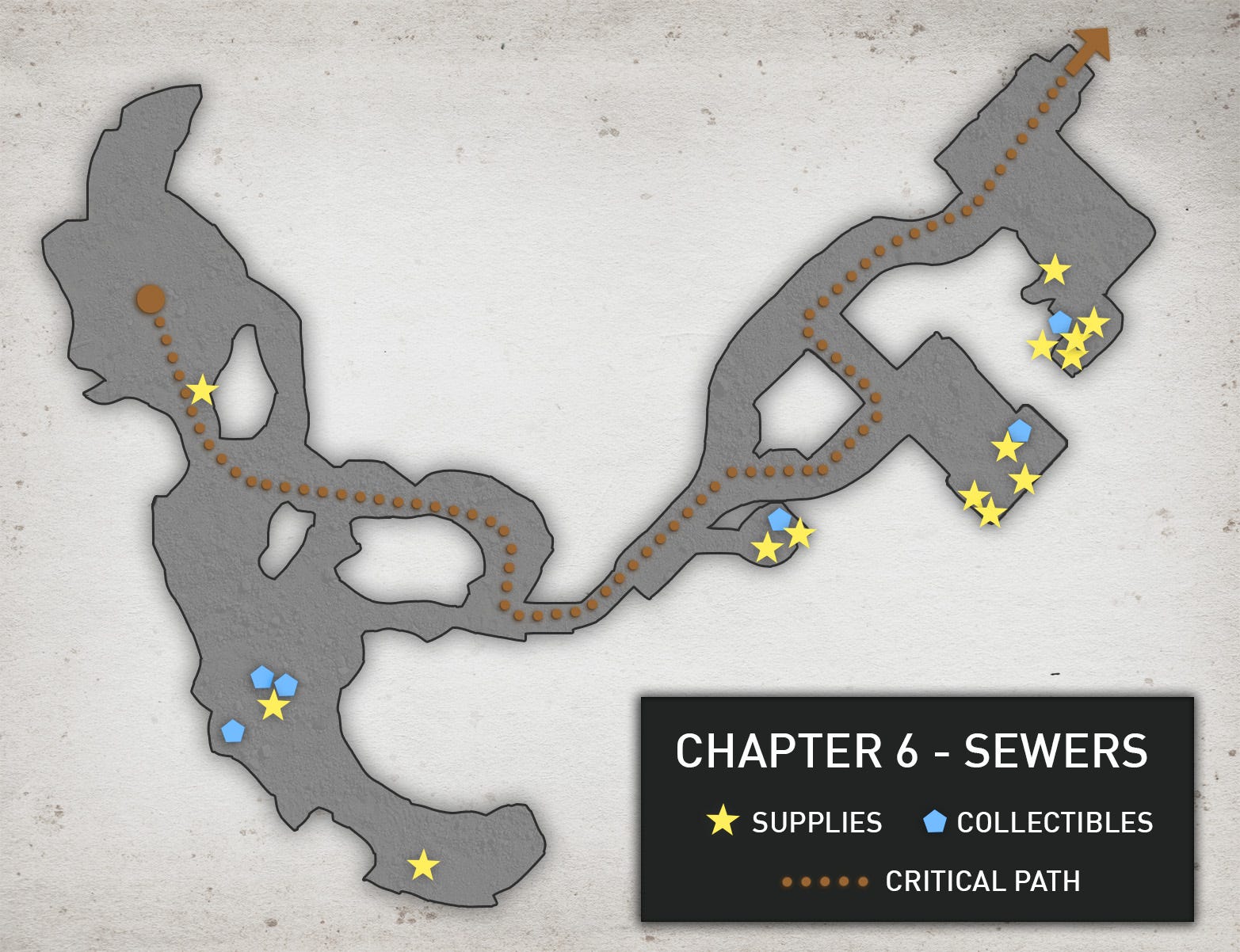
處理不同游戲風格的節奏 (Handling pacing for different playstyles)
Each section with enemies, whether human or infected, feels particularly tense in The Last of Us. Joel is capable of handling many threats, but not at once. Unlike in action games, you rarely feel comfortable doing so.
在《我們的最后》中,每個遇到敵人的部分,無論是人類還是被感染者,都感到特別緊張。 喬爾有能力應對許多威脅,但不能一次。 與動作游戲不同,您很少會感到自在。
Stealth is encouraged, you have limited ammo and often need to retreat to cover. The game also needs to balance the crafting supplies to maintain permanent pressure during those phases. If the player ever has too much, they won’t feel threatened and won’t approach situations as carefully as intended.
鼓勵進行隱身,彈藥有限,并且經常需要撤退才能掩護。 游戲還需要平衡手工用品,以在這些階段中保持永久壓力。 如果玩家擁有過多的東西,他們將不會感到受到威脅,也不會像預期的那樣謹慎對待情況。
Achieving this in a linear experience might seem simple on paper but in any game where the player has freedom of approach, striking the appropriate balance is difficult. How did the player overcome previous situations? Did they waste all their stuff or manage to save a lot? How much do they explore? What is their experience with video games in general?
在線性體驗中實現這一目標在紙上似乎很簡單,但是在任何玩家具有進近自由度的游戲中,要達到適當的平衡都是困難的。 玩家如何克服以前的情況? 他們浪費了所有東西還是設法節省了很多錢? 他們探索了多少? 他們在視頻游戲方面的總體經驗如何?
To address this complex design problem, Naughty Dog likely implemented a smart system to adjust the spawning of crafting supplies and ammo based on the player current inventory and selected difficulty level. I suspect they sometimes even decide the contents of drawers and cabinets at the last moment, right before they are actually opened.
為了解決這個復雜的設計問題,頑皮狗可能實施了一個智能系統,根據玩家當前的存貨和選定的難度級別來調整手Craft.io品和彈藥的產生。 我懷疑他們有時甚至在最后一刻才決定抽屜和櫥柜的內容,就在它們真正打開之前。

With this dynamic balancing, they ensure the player always has some supplies to craft items regularly, yet is never overpowered. Inventory limits (three of each item) also help to prevent hoarding.
通過這種動態平衡,它們可以確保玩家始終有一些補給品可以定期制作手Craft.io品,但絕不會過分用功。 庫存限制(每個物品三個)也有助于防止ho積。
This design solution is clever because it brings back all types of players closer to the intended experience. As a designer, you can’t just plan for the ‘ideal average’. You need to account for the ‘extremes’ too.
這種設計解決方案很聰明,因為它可以使所有類型的玩家更加接近預期的體驗。 作為設計師,您不能僅僅為“理想平均值”做計劃。 您還需要考慮“極端”。
Even if your system encourages a particular playstyle (here: exploration and strategy), your duty as a designer is to entertain everyone, not just those who obediently follow the rules you wrote for them.
即使您的系統鼓勵一種特定的游戲風格(在這里:探索和策略), 作為設計師的您的職責也是娛樂所有人,而不僅僅是順從地遵循您為他們編寫的規則的人。

An excellent illustration of this philosophy is the ‘gift’ mechanic: when you’re very low on health or ammo, allies occasionally drop you some.
這種“禮物”機制就是一個很好的例證:當您的健康或彈藥水平很低時,盟友有時會丟給您一些東西。
Naughty Dog designers don’t fall in the ego trap of the creator: they don’t punish the player for failing at the game, they don’t turn it into a lecture either, they just subtly help players to get back on track.
頑皮狗的設計師不會陷入創造者的自我陷阱:他們不會懲罰因游戲失敗而導致的玩家,也不會將其變成演講,他們只是巧妙地幫助玩家重回正軌。

第2部分:使用項目 (Part 2: Using items)
The Last of Us has six items to craft. It’s relatively few compared to other crafting systems, but quality prevails over quantity: each brings a unique gameplay possibility and reinforces player autonomy.
我們中的最后一個有六個項目可以制作。 與其他制作系統相比,它相對較少,但質量勝于數量:每種系統都帶來獨特的游戲可能性,并增強了玩家的自主權。

健康包 (Health Kit)
Using the health kit grants you a large chunk of health points. Simple as that. You’re vulnerable during the long seconds of application, which creates tension when you have to heal during the battle and only found a precarious hidden spot to do so.
使用健康套件可以為您提供大量的健康點。 就那么簡單。 在長時間的應用過程中,您很容易受到攻擊,這在您必須在戰斗中進行治療時會產生緊張感,并且只能找到一個不穩定的隱患。
希夫 (Shiv)
The Shiv is a more profound item with several possible uses; the player must decide whether they want to spend them to:
Shiv是一個更深刻的項目,具有多種可能的用途。 玩家必須決定是否要花費他們:
- Execute ‘runners’ and human enemies twice as fast as the free strangulation, which can be decisive in stealth situations. 處決“流浪者”和人類敵人的速度是自由絞殺的兩倍,這在隱身情況下可能起決定性作用。
- Kill the ‘clickers’, powerful infected which otherwise instantly murder you. 殺死被強大感染的“咔噠聲”,否則立即將您殺死。
- Open ‘shiv doors’, caches filled with many supplies and items. 打開“儲物柜門”,存放許多物資和物品的高速緩存。
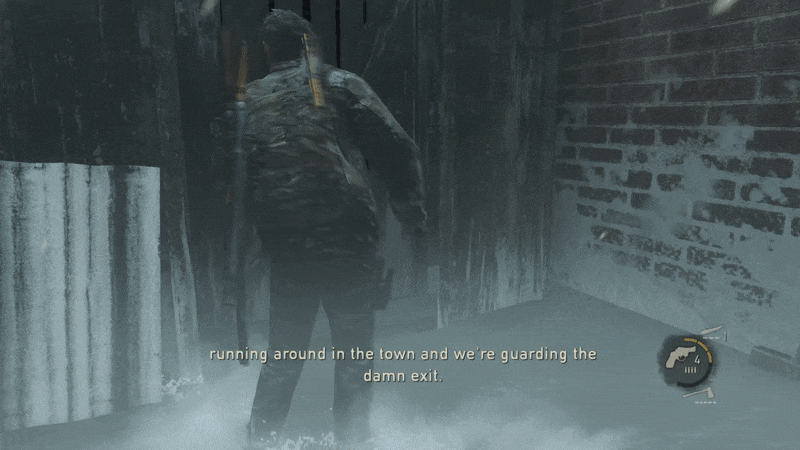
Between the three, you quickly realise that faster stealth kills are the least interesting option to waste a shiv on. Which leaves us with this decision: should I spend my shivs to handle a clicker or to open the shiv door for additional rewards?
在這三個之間,您很快就會意識到,更快的隱形擊殺是浪費時間的最不有趣的選擇。 這讓我們做出了這樣的決定:我應該花我的濕屑來處理答題器還是打開濕屑門以獲得更多獎勵?
The Last of Us is a linear game: when you get in front of a door with no possible way to open it, you must move on knowing you’re missing whatever was behind. You want to anticipate and save shivs to prevent this. But conversely, whenever you get slaughtered by a clicker, you seriously reconsider if the last door you spent a shiv on was worthwhile.
《最后的我們》是一個線性游戲:當您進入一扇門前而無法打開門時,您必須繼續前進,直到知道自己丟失了背后的東西。 您要預料并保存碎片以防止這種情況。 但是相反地,每當您被答題器宰殺時,您都會認真考慮是否花了最后一口錢才值得。
The dilemma is intense.
困境非常嚴重。

近戰武器升級 (Upgraded melee weapon)
It takes several hits to take down an enemy with your fists, a few with a melee weapon and just one (and a thrilling animation) with the craftable upgraded melee. Time is precious in combat situations with multiple threats.
用拳頭擊落一個敵人需要幾次擊中,使用近戰武器需要擊中幾下,而可以制作的升級近戰武器只有一個(和令人振奮的動畫)。 在有多重威脅的戰斗情況下,時間是寶貴的。

莫洛托夫雞尾酒,指甲炸彈和煙霧彈 (Molotov cocktail, nail bomb & smoke bomb)
The Last of Us has three throwable items, each with its own speciality.
我們最后的人有3個可擲物品,每個物品都有自己的特色。
Molotov Cocktail burns enemies in a radius, fire also propagates and can ignite more targets.
莫洛托夫雞尾酒在半徑范圍內燃燒敵人,火勢還會蔓延并點燃更多目標。
Nail bomb does a lot of damage and only explodes when enemies are nearby, so you can also use it preventively as a land mine.
指甲炸彈會造成很大的傷害,并且只會在附近有敵人時才會爆炸,因此您也可以預防性地將其用作地雷。
Smoke bomb stuns any enemy within its area of effect, giving you time to either hide or rush towards the opponent.
煙霧彈會擊暈其作用范圍內的所有敵人,讓您有時間躲藏或沖向對手。

解鎖節奏 (The pacing of unlocking)
Naughty Dog is particularly vigilant when it comes to maintaining a smooth tempo for their games. Items discovery is no exception.
頑皮狗在保持游戲節奏平穩時尤其要保持警惕。 物品發現也不例外。
All six are unlocked one after the other throughout the first third of the game, outside of combat most of the time, so Naughty Dog also ensures the player fully dedicates their attention to noticing the new gameplay tool. Once the item is discovered, its craft recipe is unlocked and appears in the menu (which is almost empty and therefore not overwhelming at the start).
在整個游戲的前三分之一中,大部分時間都是在戰斗之外的所有六個時間里,一個接一個地解鎖的,因此調皮的狗還確保玩家充分專注于注意新的玩法工具。 一旦發現該物品,其Craft.io配方將被解鎖并顯示在菜單中(該菜單幾乎為空,因此一開始不會讓人感到不知所措)。
The only exception is for the Health Kit, which teaches us another design lesson. You get to use the item first and later get the recipe to craft it yourself. Tess also gives you whatever supplies you’re missing to make one on the spot.
唯一的例外是健康工具包,該工具包教給我們另一堂設計課程。 您可以先使用該物品,然后再獲得自己制作的食譜。 苔絲還為您提供了當場制作所需的任何耗材。
Spreading tutorials is always a good idea (lesson 1 ‘Use health kit to heal’, lesson 2 ‘Crafting them’), so is ensuring the player can practice the theory directly. This moment isn’t the first time crafting, but reminders are never too much for the fundamental mechanics of your game.
散布教程始終是一個好主意(第1課“ 使用保健工具包治愈” ,第2課“ 制作它們” ),因此確保玩家可以直接練習該理論。 這一刻不是第一次,但提醒對于您的游戲基本原理永遠不會太多。
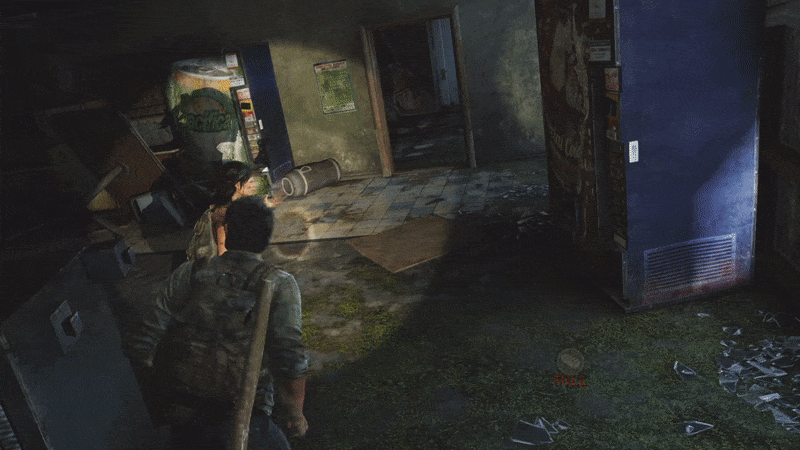
第3部分:制作物品 (Part 3: Crafting items)
尋找合適的UX (Finding the right UX)
The crafting menu is split into three areas:
制作菜單分為三個區域:
- The left side is Joel checking inside his backpack. The game isn’t on pause, crafting is risky, and you have reduced view of your surroundings. 左側是喬爾(Joel)在他的背包內檢查。 游戲不會暫停,制作風險很大,您對周圍環境的視線也有所減少。
- You select items in the central column, the wrench icon to indicating in a glance if you have enough supplies. 您在中間一欄中選擇項目,扳手圖標一目了然,以指示您是否有足夠的耗材。
- On the right is the informative section, with both an overview of your inventory and input reminders. 右側是信息部分,其中包含庫存概述和輸入提醒。

Alexandria Neonakis, the UI designer on the project, explained in this article how she designed the whole crafting flow so you’d need to spend a minimal amount of time in menus. She details the iterative process for the weapon interface, and we can assume the same for the crafting system.
該項目的UI設計師Alexandria Neonakis在本文中解釋了她如何設計整個制作流程,因此您需要在菜單上花費最少的時間。 她詳細介紹了武器界面的迭代過程,我們可以為制作系統假設相同的過程。
In the first gameplay demo showcased at E3 2012, the structure and visual look of menus were entirely placeholders for what looks like the same final system.
在E3 2012上展示的第一個游戲演示中,菜單的結構和視覺外觀完全是占最終系統外觀的占位符。
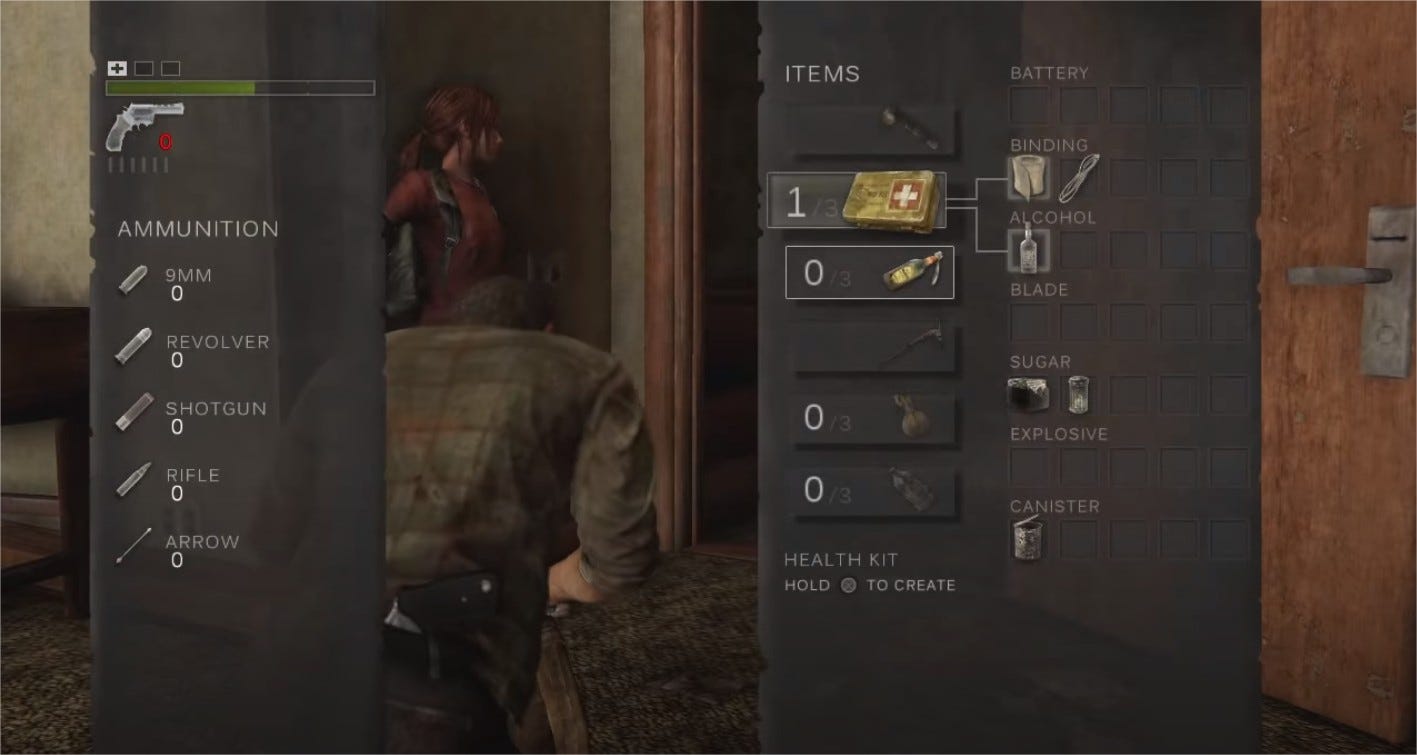
Alexandria was brought into the team in November 2012, only eight months before the game released. By early 2013, the menu wireframe was already there, although the art differs from the final result.
2012年11月,亞歷山大(Alexandria)被帶入車隊,距離比賽發布只有八個月。 到2013年初 ,菜單線框已經存在,盡管其藝術與最終結果有所不同。

This version looks encumbered, especially the wall of icons: did they decide to switch to a max capacity of three because of it or was it purely based on the balancing efforts on gathering?
這個版本看起來很麻煩,尤其是圖標墻:他們是因為這個決定決定切換到最大容量三,還是純粹基于收集方面的平衡工作?
Although this version of the interface is lighter, it still has intense colours which stand out. It changed in the following months for silhouette icons, and the use of colour was kept minimal. The information is still clearly communicated to the player but subtly preserves the immersion.
盡管此版本的界面較輕,但它仍具有強烈的色彩,脫穎而出。 在接下來的幾個月中,剪影圖標發生了變化,并且對顏色的使用保持最少。 信息仍然清晰地傳達給玩家,但巧妙地保留了沉浸感。
Even late in the production, Alexandria and the team never stopped making adjustments to increase clarity and usability. If you pay attention to menus in the making-of, you can spot numerous iterations. The examples below come from a single video; I count at least five differences with the final version.
甚至在生產后期,Alexandria和團隊也從未停止過進行調整以提高清晰度和可用性。 如果您關注菜單中的菜單,則可以發現許多迭代。 下面的例子來自單個視頻 ; 我認為最終版本至少有五個差異。

Hard work pays off. The result is honestly outstanding. Look at the gif below how effortlessly you can start from the item cross, hold the button to craft, then close the menu and use the health kit in a continuous motion.
付出就有收獲。 結果是非常出色的。 查看下面的gif,您可以輕松地從商品交叉處開始,按住按鈕進行制作,然后關閉菜單并連續使用健康套件。
All the info come in a glance, all the actions take a snap of fingers.
所有信息一目了然,所有動作都只需動一下手指即可。
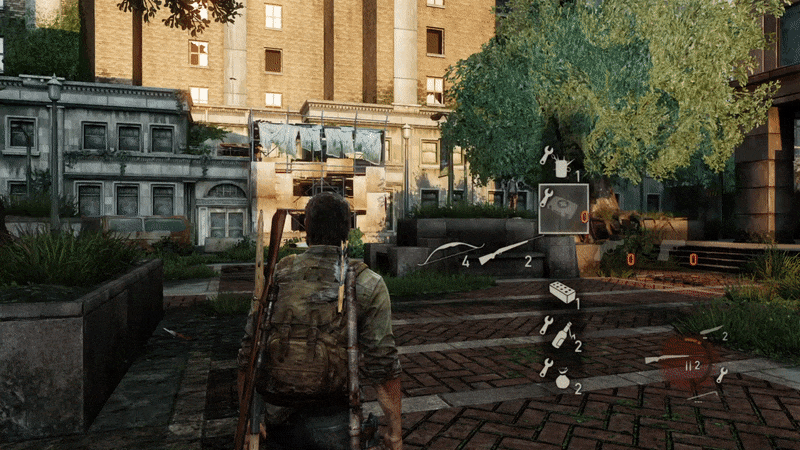
極簡主義和沉浸感 (Minimalism and maintaining immersion)
Human brains have a hard time perceiving what’s missing; this is sometimes referred to as “absence blindness”.
人類的大腦很難感知缺失的事物。 這有時被稱為“ 失明失明 ”。
At Naughty Dog, they know they can leverage this cognitive phenomenon to keep the player’s focus on the right elements. As I explained in a previous piece, they expertly, maybe unconsciously, avoid drawing attention to the latent weirdness of some game mechanics.
在Naughty Dog,他們知道他們可以利用這種認知現象來保持玩家對正確元素的關注。 正如我在上一篇文章中所解釋的那樣 ,他們會專業地(也許是在不知不覺中)避免引起人們對某些游戲機制潛在怪異的注意。

See what’s missing here from this crafting menu? Numbers.
看看這里的菜單缺少什么? 數字。
Here is the design problem: each recipe requires a combination of two components. You want to encourage the player to scavenge, which means giving supplies often enough, or they’ll be discouraged. But you also want to retain the tension and not have the player carry a whole arsenal. What’s the solution here?
這是設計問題:每個配方都需要兩個組件的組合。 您想鼓勵玩家進行清理,這意味著要經常提供足夠的補給,否則就會灰心。 但是,您也想保持緊張局勢,不要讓球員攜帶整個武器庫。 這里有什么解決方案?
Most games handle this by throwing in numbers and then figure out balancing: three of this and five of that turns into one item. This approach technically works, but it has the negative side effect of highlighting the rigidity of the crafting mechanic.
大多數游戲通過輸入數字然后找出平衡來解決這一問題:其中三個和五個變成一項。 這種方法在技術上是可行的,但具有負面影響,即突出了手工技藝的剛性。
I had a go at applying this to The Last of Us and produced a mock-up of what it could have looked like to present supplies with numbers, with the exact same rules for the mechanic. Suddenly, you want to question why twelve is the limit for inventory. Immersion ruined.
我嘗試將其應用到《最后的我們》中,并制作了一個模型,模擬了如何用數字為補給品提供物品,并具有與修理工完全相同的規則。 突然,您想質疑為什么庫存限制為十二。 沉浸毀了。

Instead of numbers, The Last of Us present supplies in icon quarters which makes both for a cleaner design and give them the flexibility to scatter supplies. The vocabulary and the quantities are also kept intentionally vague (no ‘this pair of scissors you picked-up is worth 3 blades’).
《最后的我們》以數字形式展示了耗材,而不是數字, 這既使設計更整潔,又使它們可以靈活地分散耗材。 詞匯和數量也故意保持模糊(沒有“您拿起的這把剪刀不值3把刀片”)。
The more you try to justify it, the weirder it feels, so don’t.
您嘗試證明其合理性的方法越多,感覺就越怪異,所以請不要。
Craft.io食譜的困境 (Dilemmas in craft recipes)
To create each item, you need to assemble two components (except the upgraded melee weapon). Designers iterated on the recipes throughout the project, as you might have seen from the early screenshots above, they cut batteries for flashlamps (probably too annoying in dark areas). Here is a diagram of the craft recipes in the final game.
要創建每個項目,您需要組裝兩個組件(升級后的近戰武器除外)。 正如您從上面的早期屏幕截圖中可能已經看到的那樣,設計人員遍歷整個項目的配方,他們削減了閃光燈的電池(在黑暗區域可能太煩人了)。 這是最終游戲中的Craft.io配方圖。
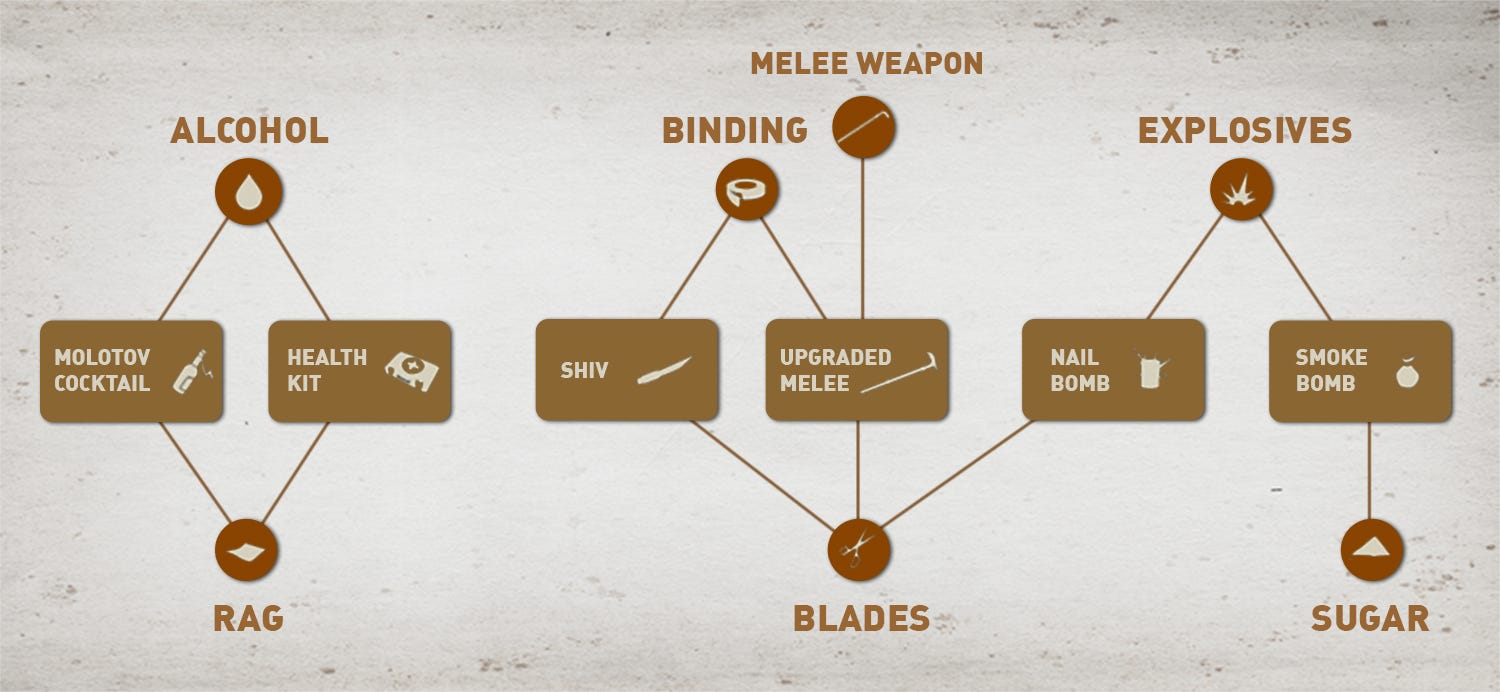
Presented this way, you can immediately spot the decisions on how to use your supplies. The pair alcohol/rag combination is the most obvious; the rest doesn’t have as discernable of a pattern (to break the monotony) but still clearly show designers made recipes to reinforce player choices.
通過這種方式呈現,您可以立即發現有關如何使用耗材的決定。 酒精/抹布對最為明顯。 其余的沒有一種可識別的模式(打破單調),但仍然清楚地表明設計師制定了配方來加強玩家的選擇。
When you come across supplies, you always pick them. Designers could have made scavenging a choice with a rule such as “you’re faster when your backpack is empty”, which is coherent within the narration, but they didn’t. They want the player to fill their inventory to have choices on how to spend it.
當您遇到耗材時,您總是會選擇它們。 設計師本可以通過諸如“背包空著時會更快”之類的規則來做出選擇,但這在敘述中是連貫的,但事實并非如此。 他們希望玩家填充他們的庫存,以選擇如何使用它。
Most of the time, the player faces some dilemmas in the crafting menu. Even if you carry very few supplies, the recipe design has a high probability of having more than one craftable item. This design decision has two benefits for the experience.
大多數時候,玩家在制作菜單中面臨一些難題。 即使您只攜帶很少的補給品,配方設計也很可能擁有多個可加工的物品。 該設計決策對于體驗有兩個好處。
Firstly, being forced to make a choice emphasises how important it is to scavenge. You hate to have such limited supplies, only to be forced to choose between nail bomb and upgraded melee — you really want them both.
首先,被迫做出選擇強調了清除的重要性。 您不愿擁有如此有限的補給品,而只能被迫在釘子炸彈和升級的近戰中進行選擇-您真的希望兩者兼具。
Secondly, you can directly correlate your past decisions with your current situation; sometimes they will be reinforced, other times they will be a source of regret. Items fit into different strategies, and you don’t know in advance what you’ll encounter. You decide based on incomplete information and hope for the best.
其次,您可以將過去的決策與當前的狀況直接關聯起來; 有時他們會得到加強,其他時候他們會成為遺憾的源頭。 項目適合不同的策略,并且您事先不知道會遇到什么。 您根據不完整的信息做出決定,并希望獲得最好的結果。
These are the great choices in games, the ones you remember and reflect on later.
這些是游戲中的絕佳選擇,您會記得并在以后進行反思。

結論 (Conclusion)
The Last of Us doesn’t have the deepest crafting system ever seen in gaming; it doesn’t have hundreds of recipes; it doesn’t allow any creativity. But it’s still one of the greatest I’ve played with because it expertly conveys the narrative intentions of the experience.
《最后的我們 》沒有游戲中最深的制作系統; 它沒有數百種食譜; 它不允許任何創造力。 但這仍然是我玩過的最棒的游戲之一,因為它可以熟練地傳達體驗的敘事意圖。
The permanent tension, the never-wracking dilemmas. A feeling of scarcity balanced by the joys of surprising exploration. A rewarding need to have a careful, methodic approach to each encounter.
永久的緊張局勢,永無止境的困境。 一種稀缺的感覺與令人驚奇的探索樂趣相平衡。 對于每次遇到的問題,都需要采取認真,系統的方法來解決。

It’s what good entertainment is all about: to take you on a journey and make you experience powerful emotions. The Last of Us is unique because it accomplishes this thanks to a well-crafted story, characters, and art design. Equally compelling are the clever gameplay and system design that work so effectively that you don’t even notice.
這就是好的娛樂的全部內容:帶您踏上旅途,讓您體驗強烈的情感。 《最后的我們》之所以與眾不同,是因為它通過精心制作的故事,人物和藝術設計來實現這一目標。 同樣引人注目的是聰明的游戲玩法和系統設計,它們如此有效地工作,以至于您甚至都沒有注意到。
翻譯自: https://medium.com/super-jump/the-brilliant-crafting-system-in-the-last-of-us-bb33f221f2c1
出色的社區網站
本文來自互聯網用戶投稿,該文觀點僅代表作者本人,不代表本站立場。本站僅提供信息存儲空間服務,不擁有所有權,不承擔相關法律責任。 如若轉載,請注明出處:http://www.pswp.cn/news/275785.shtml 繁體地址,請注明出處:http://hk.pswp.cn/news/275785.shtml 英文地址,請注明出處:http://en.pswp.cn/news/275785.shtml
如若內容造成侵權/違法違規/事實不符,請聯系多彩編程網進行投訴反饋email:809451989@qq.com,一經查實,立即刪除!






》...)








)


